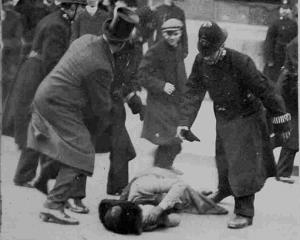
When I was a little girl, I saw photographs of the Suffragettes standing gracefully in their corsets, long dresses and enormous hats. They held signs and sometimes pushed baby prams, the epitome of ladylike poise.
I had a garbled view of history, as most children do. I thought that women’s liberation was a mostly American movement that began with Susan B. Anthony and ended with the 19th amendment– when, after those lovely demonstrators in big hats had marched and carried their signs, the men in Congress graciously conceded their point and granted them suffrage, and all the world was made well by our example. It was all sweet and lighthearted enough to be poked fun at in Mary Poppins and other children’s entertainment.
When I grew up, I saw the other pictures. The ones we don’t show children. The pictures of graceful women in that same awkward Victorian dress lying on the ground being kicked; doubled over being beaten; shielding themselves from projectiles. The pictures of suffragettes being dragged off to prison by old-fashioned policemen in genteel uniforms acting anything but genteel. The pictures of suffragettes tied up and force fed.
I started to read. I learned that this was a movement that was not an American innovation– though, of course, there were many notable Americans involved. I read Mary Wollstonecraft, Abigail Adams, Anne Knight, Sojourner Truth; women who came well before those graceful Victorian suffragettes and pleaded for equality, railed against inequality– but they didn’t get equality. They didn’t hope to get equality for themselves or for their daughters, but they said what they had to say anyway, because it was right. Maybe those graceful suffragettes didn’t expect to get anywhere either, but they organized, and they kept fighting. They persevered, in spite of terrible violence and persecution, because they were right.
I looked around myself and saw that things were not the way I’d understood them to be in modern times, either. It had been presented to me that every feminist after the ratification of the nineteenth amendment was just an hysterical fool, an attention seeker, someone who secretly wanted to erase authentic femininity and kill unborn babies. I was told that we all became equals in 1920 when women won the right to vote. I was given the example of how feminists rallied around Bill Clinton and his inexcusable treatment of other women, to show me that feminism was all a sham. I despised Bill Clinton, and I still do.
But I have discovered that it’s not all a sham.
When statistics predict that one in five women will be raped at some point in their lives compared with one in 71 men, it’s not a sham.
When violence against women is so commonplace that we’re mocked if we bring it up and accused of being hysterical if we press the point, it’s not a sham.
When a man who brags about grabbing women by the genitals and walking into locker rooms to leer at teenage beauty queens can be elected president, it’s not a sham.
When a woman can testify that she was sexually assaulted by a man who went on to be a powerful judge, and I hear so many people say “even if he’s guilty, I still hope he gets on the supreme court,” and then he does get confirmed by the senate, by male and female senators together, without a thorough investigation, because political turf wars are more important than taking violence against women seriously, it’s not a sham.
And before anyone says that Kavanaugh’s appointment is really about saving the lives of unborn children– it’s not. It simply isn’t. I am pro-life. The number of abortions I’d be happy with taking place is zero. But I know that overturning Roe versus Wade will not make abortion go away, nor even ban legal abortion– you’d be surprised at how many pro-life people think that those three distinct things are the same. And I agree with Senator Collins, at least insofar as she says that Kavanaugh is not going to touch Roe Versus Wade. As far as abortion is concerned, I believe this is a red herring. I could be wrong. There are genuinely pro-life justices out there. I don’t believe Kavanaugh to be one of them. And even if he were, there are pro-life justices without any sexual assault accusations against them– ones who would never talk back to a female senator as disrespectfully as Kavanaugh did during his hearing. He wasn’t kind to anyone, but I heard him answer female senators far more offensively than he did to their male colleagues again and again. It was obvious to me, and to everyone who was listening to the hearing with me. Whatever he says, this is not a man who respects women as equals. He may or may not have sexually assaulted anyone, but he isn’t especially pro-life and he doesn’t respect women.
And I am very angry. Most of the women and men I know are angry at this. I’m discouraged beyond words that this is the world I live in. I don’t expect it to get better soon. I expect it to get worse before it gets better. I don’t think I will be handing on a world that respects women to my daughter, maybe not even to her daughters.
I realize that a struggle for a world that values and respects women will not be a graceful or a simple matter. It’s going to be a terrible thing. It will be expressed to us again and again that we live in a world where we do not matter, and this will not be expressed merely in words but in a redoubling of violence.
But we must persevere.
We must keep fighting.
And I will.
Because it is right.
(image via Wikimedia Commons)












